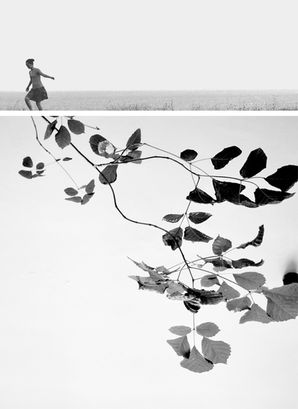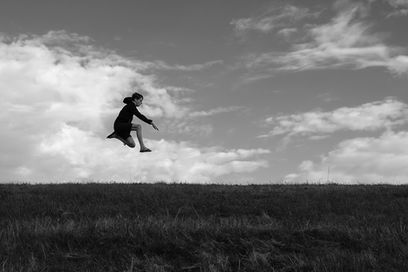
VITAMIN SEA
October 7, 2020
INTERVIEW
PHOTOGRAPHY Rosamaria Filograsso
INTERVIEW Melanie Meggs
The soothing sound of the waves crashing against the shore, the sun setting on the horizon, and the people playing in the crystal blue sea- these are all the things that attract self-taught photographer Rosamaria Filograsso to the art of photography. For her, it's like a superpower, a visionary look into reality that she can't find anywhere else. Through her lens, she's able to capture moments of joy, energy, and happiness that she can't find elsewhere. She uses this superpower to explore her hometown of Barletta, Italy, where her parents still live today. This is where she started her ongoing personal project called VITAMIN SEA. Here, Rosamaria has been able to dig deeper into her culture and explore the relationship between the people and the sea in a beach environment.
In this interview, we explore Rosamaria's journey as a self-taught photographer and how she has used her superpower to capture moments of joy and energy through her lens. We will uncover how the sea has become an integral part of her life and how it has become her source of Vitamin Sea. So join us as we dive into Rosamaria’s story and explore the depths of her vision.

“My sea is a lively place, a bright place of joy is a sort of natural vitamin supplement called VITAMIN SEA, where you are able to recharge one’s personal batteries like nothing else. Ready to make you feel alive again and full of energy.”
IN CONVERSATION WITH ROSAMARIA FILOGRASSO
THE PICTORIAL LIST: For your feature you sent us your photo project VITAMIN SEA. Rosamaria please tell us more about your project, what you were thinking about, and how you approached putting it together.
ROSAMARIA FILOGRASSO: My project VITAMIN SEA had a casual birth, with the first photos dated back in 2010. It began to take a proper shape some years later when I bought my Nikon camera, my first 'grown up' camera. It was natural for me to bring it along during every summer holidays in my hometown of Barletta in the hot South of Italy where my parents still live by the sea. I documented summer and beach life and, year after year, when I was in Barletta or visiting another beach place in the South of Italy, I grew my collection of beach moments and beach people.
A couple of years ago while scrolling through my archives I realized those images had a lot more in common that I would of thought, and I started to work with them to explicit the narrative hidden within. So, yes, I would say that here the photographs came first and helped shaping their inner story. And because every year I visit Barletta I will keep on working on the project for the years to come.
I love witnessing the way the relationship between people and their life-by-the-sea is changing through the years, especially now as new generations follow.
This is my first ongoing project, it is teaching me to get as organized as possible, because I only spend about ten days at the beach each year to take photos. So I must treat shooting time as carefully as I can. Dealing with a high number of photos is also crucial as both the selection and the editing part is not easy, plus it’s done over a long period of time.
Finally, should I mention the greatest achievement I would say VITAMIN SEA pushed me to break the ice and to create a common field of trust with all the people I have met and photographed throughout the years.
TPL: When did you start getting interested in photography?
RF: I am a self-taught photographer living in Milan, but I am born and raised in Barletta, a city by the sea in the South of Italy. Although photography it’s not my job at the moment, I have gravitated around it all my life. My father was a keen photographer, he used to take tons of photos of me and my sister everyday and to collect cameras. I was fascinated that’s why when I was about 10 I asked for a camera, he bought me my first one and taught me photography.
My partner is also a talented photographer. We love spending time discussing photography, going to photo exhibitions, buying photography books, commenting on the photos we take, playing each other’s photo editors.
My 9-to-5 job is in marketing and communication, so also during my office life photography is on my radar, having I to deal with images and their power on a daily basis.
TPL: Do you have a favourite quote that resonates with you the most?
RF: Yes! Martin Parr once said: “Photography is the simplest thing in the world, but it is incredibly complicated to make it really work”.
I think it’s 100% self-explanatory! Just clicking the shutter button is not enough to have a proper photo, and this is even more true nowadays where everybody is (or better: believes to be) a photographer. But I guess that’s a feature of the image-based society we’re living in that has, unfortunately, depreciated good photography. So it’s even more important to curate and support good and meaningful photography: it’s a matter of culture, which is fuel for progress in the society.
TPL: Where do you find your inspiration?
RF: Music and photography books are my greatest source of inspiration. They act like a mood board for when I have to start any photo essay!
TPL: Do you have any favourite artists or photographers you would like to share with us, and the reason for their significance?
RF: Luigi Ghirri and Martin Parr are my Maestri, those I rely to whenever I feel blah and uninspired. I understand it’s an odd pairing but I am hopelessly fascinated by opposites! In particular, Parr teaches me how to compose images when there are crowds involved, while Ghirri educates my eye putting serenity, calmness and poetry into photos.
TPL: Where is your favorite place to photograph?
RF: All places where people interact and do stuff...are my favourite!
VITAMIN SEA pushed me to break the ice and to create a common field of trust with all the people I have met and photographed throughout the years.

TPL: Has your style of photography changed since you first started?
RF: Yes, it has changed and a lot.
First, in terms of composition I improved greatly.
Secondly (and related) my photography is grown up more in terms of “getting straight to the point”. I have learnt how to concentrate my photographic efforts towards one or few elements, (being it an interesting person, some gestures or a particular situation) shaping an image which is talkative about one story.
Once I have mastered this, I want to add a higher level of complexity to my images, with different and multi-layered subjects so to create a longer narrative.
TPL: Do you prefer to photograph alone or with friends?
RF: Photographing with friends is not an option for me, because they would take my concentration away leaving me with zero productivity. Moreover, I am sure they would be fed up soon of spending time with a photographer in action constantly looking for the next interesting face or situation to visually explore.
Sometimes I photograph with my partner - and I like that because obviously he knows how it works and what it means to spend the whole day walking and yearning for people and places interesting enough to contribute telling a story.
TPL: What equipment do you prefer to use? Do you think equipment is important in achieving your vision in your photography? Do you have a preferred lens/focal length?
RF: My camera is a Nikon D750 and 90% of the time I use a 50mm lens. I love that lens because it provides the right amount of distance if I want to photograph someone or something either near or far. Being not to wide it forces me to select the right elements to give importance to, and that really both simplifies and makes the process of taking a good photograph much more efficient.
TPL: Is there anything you want to express through your photography? And what are some of the elements you always try to include in your photographs? Have you ever been involved in the artistic world before photography?
RF: Photography is visionary, it has this amazing super power of going beyond reality, making you daydream: that’s exactly what I want to express with my images, and that’s exactly the reason why I consider photography as the visual sister of poetry. To achieve that, the elements I always try to include in my photographs are: simplicity, humor, a bit of surrealism.
I love all art forms: music (I play bass guitar and sing), cinema (when I was younger I have been attending Venice International Film Festival as a jury member of one of the independent and unofficial awards), ancient and modern visual art, architecture, sculpture and design… but apart from attending exhibitions, museums, events etc.
TPL: Are there any special projects you are currently working on that you would like to let everyone know about? What are some of your goals as an artist? Where do you see yourself or hope to see yourself in five years?
RF: I am planning to shape a photo essay “looking harder” and with more attention at people and habits of Milan, the city that welcomed me 21 years ago.
The idea here is that the ordinary is always taken for granted and under-valuated just because it belongs to what’s familiar. We usually feel attracted by what’s uncharted, so my goal is to try and reverse that point of view and finding the exotic in the familiar.
As an artist my main goal is to always use photography with the greatest sense of responsibility. The power of photography is to document our complicated world, so I hope to do so in a way that makes people appreciate what we are seeing, think in a non superficial way and - last but for for least - have a healthy laugh of ourselves if needed!
With that in mind I wish to keep on improving both my narrative and composition skills and reach my professional aspiration of working as an editorial photographer for magazines.
TPL: "When I am not out photographing, I (like to)…
RF: Listen to The Beatles, I am their number one fan!"

Rosamaria Filograsso's stunning photography serves as a reminder of the beauty that exists in the world and how, she is able to capture the people and culture around her. With every frame, we can experience the emotion and energy behind it, whether it's the calming effect of the waves or the joy of the people playing on the shoreline. We invite you to dive into more of Rosamaria’s photography and explore the depths of her vision.


































